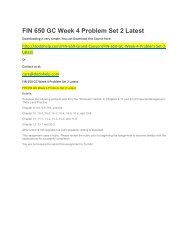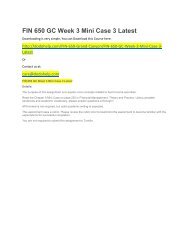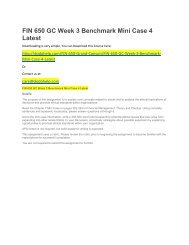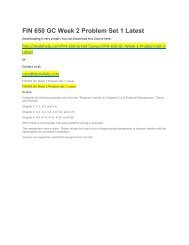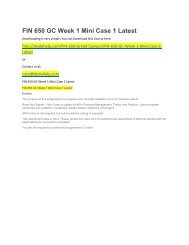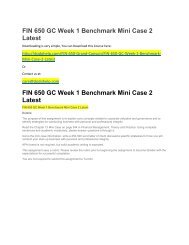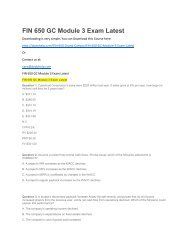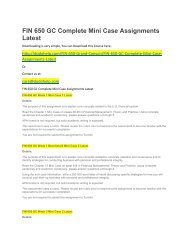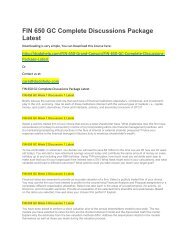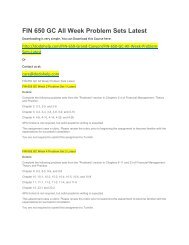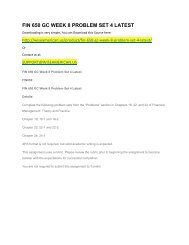FIN 650 GC Entire Course Latest
You also want an ePaper? Increase the reach of your titles
YUMPU automatically turns print PDFs into web optimized ePapers that Google loves.
<strong>FIN</strong> <strong>650</strong> <strong>GC</strong> <strong>Entire</strong> <strong>Course</strong> <strong>Latest</strong><br />
Downloading is very simple, You can Download this <strong>Course</strong> here:<br />
http://dodohelp.com/<strong>FIN</strong>-<strong>650</strong>-Grand-Canyon/<strong>FIN</strong>-<strong>650</strong>-<strong>GC</strong>-<strong>Entire</strong>-<strong>Course</strong>-<strong>Latest</strong><br />
Or<br />
Contact us at:<br />
care@dodohelp.com<br />
<strong>FIN</strong> <strong>650</strong> <strong>GC</strong> <strong>Entire</strong> <strong>Course</strong> <strong>Latest</strong><br />
<strong>FIN</strong> <strong>650</strong> <strong>GC</strong> <strong>Entire</strong> <strong>Course</strong> <strong>Latest</strong><br />
<strong>FIN</strong> <strong>650</strong> <strong>GC</strong> Week 1 Discussion 1 <strong>Latest</strong><br />
Briefly discuss the purpose and role that each type of financial institutions (depositary, contractual, and investment)<br />
play in the U.S. economy. How do each of these institutions intersect with the various types of markets, i.e., capital,<br />
money, spot (cash), derivatives, Forex and Interbank, primary, and secondary (inclusive of OTC)?<br />
<strong>FIN</strong> <strong>650</strong> <strong>GC</strong> Week 1 Discussion 2 <strong>Latest</strong><br />
Select a publicly traded firm of your choice that enjoys a large shareholder base. What challenges may this firm have<br />
encountered (or is likely to encounter) in terms of (a) incorporating ethics into financial management practices, and<br />
(b) maintaining/sustaining ethical practices in the face of internal or external (market) pressures? Frame your<br />
response relative to the financial manager's fiduciary duty to maximize shareholder's wealth.<br />
<strong>FIN</strong> <strong>650</strong> <strong>GC</strong> Week 2 Discussion 1 <strong>Latest</strong><br />
To live comfortably in retirement, you decide you will need to save $2 million by the time you are 65 (you are 30 years<br />
old today). You will start a new retirement savings account today and contribute the same amount of money on every<br />
birthday up to and including your 65th birthday. Using TVM principles, how much must you set aside each year to<br />
make sure that you hit your target goal if the interest rate is 5%? What flaws might exist in your calculations, and what<br />
variables could lead to different outcomes? What actions could you take ensure you reach your target goal?<br />
<strong>FIN</strong> <strong>650</strong> <strong>GC</strong> Week 2 Discussion 2 <strong>Latest</strong><br />
Financial ratios are essential to provide an accurate valuation of a firm. Select a publicly traded firm of your choice.<br />
You may use the firm you have elected to profile for the course-long Financial Analysis and Proposal assignment or a<br />
completely different organization altogether. Select one ratio each in the areas of (a) performance, (b) activity, (c)<br />
financing, and (d) liquidity warnings. Provide an evaluation of the selected firm's strengths and weaknesses. Based<br />
on the ratios you selected, how well does your chosen firm perform? Explain.<br />
<strong>FIN</strong> <strong>650</strong> <strong>GC</strong> Week 3 Discussion 1 <strong>Latest</strong><br />
You have been asked to perform a stock valuation prior to the annual shareholders meeting next week. The two<br />
models you have selected to value the firm are the dividend discount model and the discounted cash flow model.<br />
Explain why the estimates from the two valuation methods differ. Address the assumptions implicit in the models<br />
themselves as well as those you made during the valuation process.
<strong>FIN</strong> <strong>650</strong> <strong>GC</strong> Week 3 Discussion 2 <strong>Latest</strong><br />
In a rising interest rate environment, how would bond values change over time? As a bond investor, what measures<br />
would you take to manage rate risk?<br />
<strong>FIN</strong> <strong>650</strong> <strong>GC</strong> Week 4 Discussion 1 <strong>Latest</strong><br />
Explain how the decision of the Federal Reserve Bank (Fed) to raise interest rates would be expected to affect each<br />
component of the weighted average cost of capital (WACC). What mistakes are commonly made when estimating the<br />
WACC, and how do these mistakes arise?<br />
<strong>FIN</strong> <strong>650</strong> <strong>GC</strong> Week 4 Discussion 2 <strong>Latest</strong><br />
In what types of situations would capital budgeting decisions be made solely on the basis of project's net present<br />
value (NPV)? Identify potential reasons that might drive higher NPV for a given project. Substantiate your response<br />
by providing an example to explain your thought process.<br />
<strong>FIN</strong> <strong>650</strong> <strong>GC</strong> Week 5 Discussion 1 <strong>Latest</strong><br />
How would a financial manager determine optimal capital structure? How this would fit in with the company's capital<br />
expenditures, growth plans and operating results?<br />
<strong>FIN</strong> <strong>650</strong> <strong>GC</strong> Week 5 Discussion 2 <strong>Latest</strong><br />
In a "perfect world" capital market, how important is a firm's decision to pay dividends versus repurchase shares?<br />
Under what conditions would you have a tax preference for share repurchase rather than dividends? Would<br />
managers acting in the interests of long-term shareholders be more likely to repurchase shares if they believed the<br />
stock to be either undervalued or overvalued?<br />
<strong>FIN</strong> <strong>650</strong> <strong>GC</strong> Week 6 Discussion 1 <strong>Latest</strong><br />
If you are the CFO of a multinational company. What steps could you take to minimize international risk? Describe<br />
how cash flows are used to minimize political risk.<br />
<strong>FIN</strong> <strong>650</strong> <strong>GC</strong> Week 6 Discussion 2 <strong>Latest</strong><br />
Describe the importance of international capital structure. What risks can you identify when working with cash, credit<br />
and inventory management? Provide your rationale and any supporting data.<br />
<strong>FIN</strong> <strong>650</strong> <strong>GC</strong> Week 7 Discussion 1 <strong>Latest</strong><br />
Compare and contrast two types of leases and describe the advantages and disadvantages of each. Which type of<br />
lease would produce the lowest risk?<br />
<strong>FIN</strong> <strong>650</strong> <strong>GC</strong> Week 7 Discussion 2 <strong>Latest</strong><br />
In your firm, what benefits does leasing offer, compared to the purchase of an asset? Provide examples.<br />
<strong>FIN</strong> <strong>650</strong> <strong>GC</strong> Week 8 Discussion 1 <strong>Latest</strong><br />
What could a financial manager look at to determine whether his company is successful or in distress?
<strong>FIN</strong> <strong>650</strong> <strong>GC</strong> Week 8 Discussion 2 <strong>Latest</strong><br />
Reflect on your experience in this course. What are the key takeaways you have learned in this course that you can<br />
apply tomorrow or in the near future?<br />
<strong>FIN</strong> <strong>650</strong> <strong>GC</strong> Week 1 Mini Case 1 <strong>Latest</strong><br />
Details:<br />
The purpose of this assignment is to explain core concepts related to the U.S. financial system.<br />
Read the Chapter 1 Mini Case on pages 48-49 in Financial Management: Theory and Practice. Using complete<br />
sentences and academic vocabulary, please answer questions a through d.<br />
APA format is not required, but solid academic writing is expected.<br />
This assignment uses a rubric. Please review the rubric prior to beginning the assignment to become familiar with the<br />
expectations for successful completion.<br />
You are not required to submit this assignment to Turnitin.<br />
<strong>FIN</strong> <strong>650</strong> <strong>GC</strong> Week 1 Benchmark Mini Case 2 <strong>Latest</strong><br />
Details:<br />
The purpose of this assignment is to explain core concepts related to corporate valuation and governance and to<br />
identify strategies for conducting business with personal and professional integrity.<br />
Read the Chapter 13 Mini Case on page 544 in Financial Management: Theory and Practice. Using complete<br />
sentences and academic vocabulary, please answer questions a through d.<br />
Using the mini case information, write a 250-500 word letter of intent discussing specific strategies for how you will<br />
conduct your start-up business with personal and professional integrity.<br />
APA format is not required, but solid academic writing is expected.<br />
This assignment uses a rubric. Please review the rubric prior to beginning the assignment to become familiar with the<br />
expectations for successful completion.<br />
You are not required to submit this assignment to Turnitin.<br />
<strong>FIN</strong> <strong>650</strong> <strong>GC</strong> Week 2 Problem Set 1 <strong>Latest</strong><br />
Details:<br />
Complete the following problem sets from the "Problems" section in Chapters 2-4 of Financial Management: Theory<br />
and Practice.<br />
Chapter 2: 2-3, 2-5, and 2-6<br />
Chapter 3: 3-2, 3-4, 3-5, 3-8, 3-9, and 3-10<br />
Chapter 4: 4-6, 4-10, 4-14, 4-25, and 4-26<br />
APA format is not required, but solid academic writing is expected.<br />
This assignment uses a rubric. Please review the rubric prior to beginning the assignment to become familiar with the<br />
expectations for successful completion.<br />
You are not required to submit this assignment to Turnitin.
<strong>FIN</strong> <strong>650</strong> <strong>GC</strong> Week 3 Mini Case 3 <strong>Latest</strong><br />
Details:<br />
The purpose of this assignment is to explain core concepts related to fixed income securities.<br />
Read the Chapter 5 Mini Case on page 230 in Financial Management: Theory and Practice. Using complete<br />
sentences and academic vocabulary, please answer questions a through f.<br />
APA format is not required, but solid academic writing is expected.<br />
This assignment uses a rubric. Please review the rubric prior to beginning the assignment to become familiar with the<br />
expectations for successful completion.<br />
You are not required to submit this assignment to Turnitin.<br />
<strong>FIN</strong> <strong>650</strong> <strong>GC</strong> Week 3 Benchmark Mini Case 4 <strong>Latest</strong><br />
Details:<br />
The purpose of this assignment is to explain core concepts related to stocks and to analyze the ethical implications of<br />
decisions and promote ethical standards within organizations.<br />
Read the Chapter 7 Mini Case on pages 322-323 in Financial Management: Theory and Practice. Using complete<br />
sentences and academic vocabulary, please answer questions a through d.<br />
Using the mini case information, write a 250-500 word report presenting potential ethical issues that may arise from<br />
expanding into other related fields. In your discussion, proactively strategize about possible expansion by explaining<br />
opportunities to promote ethical standards within your organization.<br />
APA format is not required, but solid academic writing is expected.<br />
This assignment uses a rubric. Please review the rubric prior to beginning the assignment to become familiar with the<br />
expectations for successful completion.<br />
You are not required to submit this assignment to Turnitin.






